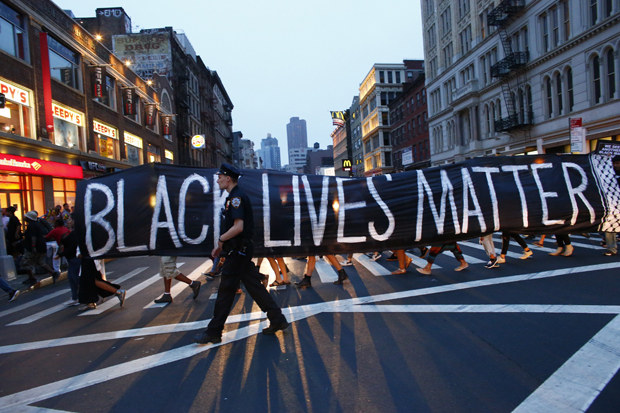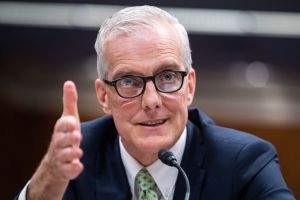It is a strange habit, the American one of making talk-show hosts into preachers. There is no good reason, after all, why a comedian should be any kind of arbiter of morality or anything much else. Yet in America the court of public opinion accepts the right of the jester to preach the homily too.
So it was that, in a period not short on ‘personal takes’ and celebrity messaging, one night in early June on his Late Late Show, James Corden delivered a teary monologue about race relations in America.
Lots of people thought he did well, and praised Corden’s talk of ‘white guilt’ and all manner of other sins. But one phrase stood out for being especially bogus. It was a phrase that was widely quoted. Corden said, ‘White people cannot just say anymore, “Yeah I am not a racist”, and think that’s enough. Because it’s not. It’s not enough. Because make no mistake, this is our problem to solve. How can the black community dismantle a problem that they didn’t create?’
To parse that whole presumptuous spiel would take longer than Corden’s show feels as if it lasts. But its central presumption is worth dwelling on. A presumption that Corden — for he is no original thinker — had simply picked up from the ether around him and regurgitated to a vast audience.
The question ‘How can the black community dismantle a problem that they didn’t create?’ has a number of obvious responses. For many people that includes the claim that America’s current problems were not created by black people, they were created by white people. Since that is an assumption which is doing very well these days, it is also an assumption that we ought to interrogate.
For even if we agree on what ‘the problem’ is, or was, there is a rejoinder waiting to raise its ugly little head. Which is that if black people are not to blame, neither are white people. Because there is not a person alive today, white or black, who can be said to have any serious culpability for any great evils you can identify in America’s past. And to play the game of apportioning blame by hereditary characteristics is to enter the same territory that makes the idea of reparations such a nonstarter. Which is that at this stage we are not even talking about a vast wealth transfer from one group of people who are alleged to have benefited to another group alleged to have suffered. What we are talking about is the suggested transfer of funds from people who look like people who did something in the past to other people who look like the people to whom the thing was done. If anyone honestly thinks that will lead to racial harmony then I should like to hear from them.
Perhaps it is unfair to seize on Corden because what he said was simply a louder version of what celebrity after celebrity and corporation after corporation have been proclaiming over recent weeks. That black people have suffered, and that white people are the cause. That history mandates that ‘white people’ as a collective take responsibility, atone, apologize, pay up and, in other practical and moral terms, right the ledger.
It is a version of the ethic which emerged three years ago with the #MeToo movement. In that case, the calculus was that women had suffered and were suffering still, and so men — as a sex — should apologize for past behavior and otherwise make up for, and improve, their behavior. When the #MeToo movement overreached, as it did very quickly (going for people who had been on bad dates and circulating anonymously compiled lists of alleged wrongdoers), there was considerable support for actions that should have been condemned.
At the height of the #MeToo overreach, when some brave voices (particularly women’s) were beginning to get nervous, one female CNN presenter even said on air that she was fine with it: ‘We’re due an overcorrection.’
Events of recent weeks appear to be another attempt at American overcorrection. This time the idea is that if a specific group has suffered an inequality then another group, perceived to have perpetrated the inequality, should abase themselves for a period in order that the moral barometer should afterwards right itself and become level. Overdoing it is part of the point. Why else do you see white people asked (or volunteering) to kneel in front of their black compatriots? What else is the point of these videos of cringing white celebrities looking distraught and begging for forgiveness? What else is all this talk of white ‘fragility’, ‘complicity’ and the burden that white people allegedly bear?
This has a number of obvious consequences. Watching the scenes of nightly protest, rioting, violence and looting, it was striking to see just what many Americans were allowing people to get away with in the name of righting a historic wrong. The networks were almost uniformly unwilling to identify and condemn these actions outright. When the headquarters of CNN in Atlanta was attacked by a mob, the network still didn’t seem able to find it in itself to condemn the assault. Ordinarily, when somebody or his or her place of work is attacked, it is not deemed healthy for the victim to find excuses (such as ‘frustration’ or ‘a sense of not being heard’) for the attacker. But in this case, staying silent or not objecting to the further immiseration of America, city after city, was viewed as a price that it was necessary to pay — part of the grand swing into overreach that would inevitably at some given point allow the needle to settle back at true equality.
Of course there are whole conferences to be held on the unhealthiness of this attitude toward racial politics. But America appears to be more than up for the idea that race and racism are a zero-sum game in which for one group to benefit another group must suffer.
So it is that almost absent from the debate of recent weeks have been people of any skin color willing to raise the fact that the racism of which so many protesters are complaining is alleged to be ‘systemic’ in districts with black mayors and black police chiefs. Why should that be? Why does America have to have a great national discussion about institutional racism without being allowed even to observe facts which sit outside the narrative of white racism/black victimhood? Likewise, the murder rates from gun violence in Chicago (which have naturally risen during this period) are a thing that non-black Americans seem to be increasingly nervous about mentioning. And so these things are just allowed to slide.
Which brings us to a central truth so tricky that the only person I have noticed in American public life brave enough to raise it has been the mathematician Eric Weinstein. He was pushed into raising it in an online video made after the ‘Science Strike for Black Lives’ and #ShutDownSTEM campaigns in early June came close to his intellectual door. He mentioned the fact that white Americans have become deeply fearful of saying anything about black Americans, and specifically that they have become strangely terrified of ever saying anything that any black American would deem wrong. But here is the thing, as Weinstein put it: ‘If I can’t tell you that you’re wrong, you’re not my equal.’
Equality between races does not include one group of people being this worried about criticizing everything from the criminal behavior of certain protesters all the way through to the idea that Stem subjects are institutionally racist and that other forms of learning need to be brought in to counter them. The need to identify wrong and bad ideas, wherever they come from, has hit the barrier in America whenever the person or people guilty of the wrong or bad idea happens to be black. And that is not just a sign that the overcorrection isn’t aiming at the best targets, but an indication that when the dial of social justice starts to move back it will not necessarily settle at equal.
This is because of the second problem, which concerns not just what some people have been allowed to get away with, but what white Americans must be thinking. Not the ones who desire to ‘take the knee’ or talk about their burden of guilt and much more, but the white Americans who are shutting up, not opening their mouths or who are agreeing to say the things that the era is demanding they say in order to continue to be allowed to live in what used to be civilized society.
Whenever I see the new slogans about ‘whiteness’ or even that unopposed one ‘Black Lives Matter’, I am reminded of Vaclav Havel’s store owner. Havel’s description (in ‘The Power of the Powerless’) is of a store owner forced by the state to have signs like ‘Workers of the World Unite’ in his shop window. He does not need to agree with the slogan, but in order to continue in business he must keep it there. For this to be possible the slogan must be very specific. It must be one of ‘disinterested conviction’, which allows the store owner to say ‘What’s wrong with the workers of the world uniting?’ It must, in other words, allow him some apparently logical mental escape from the lie he’s made complicit in and the demeaning situation in which he finds himself.
[special_offer]
Everybody knows why the slogan hangs there, and knows that if it didn’t, the shopkeeper would be in trouble. And this ends up making the sign not just a visible demonstration of the ease with which store owners can be subjugated but a daily reminder to the store owner of his subjugation. He will grow to hate the slogan he is expected to proclaim.
The slogans of our era are all around us. They are not hard to spot. From prime-time presenters on CBS to the lowliest office worker in any corporation, everybody now knows what they need to say to have a quiet life. But in such an era what is needed is people of every skin color to come out and say that the slogans and claims are not just simplistic but misleading and wrong. At a time when compliance is demanded, everyone willing to resist those calls is going to be more than usually needed.
This is not the time to pipe down, but to pipe up. Otherwise the people making all the wrong sort of noise will continue to make it unopposed, while those who agree to go along with it will become increasingly, and justifiably, grudging about this whole equality enterprise.


















